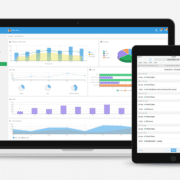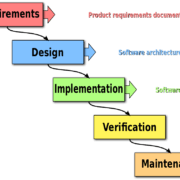Mobile Enterprise App Development: 6 Myths Debunked
Mobile enterprise app development may sound rather esoteric to most. After all, many appreneurs and developers spend time and effort creating apps for the mainstream consumer market. That means apps within the educational, entertainment, game, lifestyle, social media, and productivity categories.
However, one could argue that productivity apps closely resemble enterprise apps. And yes, many enterprises will use apps, such as Office365, Slack, and Trello, to boost productivity. And it’s even possible to customize many of these productivity apps to fit the needs of an enterprise.
While that sounds great, not all mainstream productivity apps and other turnkey solutions can solve specifically unique needs. For example, Trello is an effective and user-friendly project management tool, but best suited for simple projects. But for more complex use cases where it’s necessary to store, share, and retrieve plenty of notes, Trello may fall short.
Think of an architecture and design firm dealing with bidding procedures, construction documents, construction administration, programming design, schematic designs, design development, and post-construction tasks. Furthermore, the firm’s staff will want to share and edit resource-heavy ArchViz animations and 3D CAD models in real-time with each other and all the relevant stakeholders.
With so much documentation, designs, and 3D visuals, the design firm will require a more robust custom solution than Trello or other turnkey solutions. The firm may approach an acclaimed and reputable studio, such as NS804, to provide a custom solution. And since NS804 specializes in mobile enterprise app development, we can build an app that has all the features that the firm requires for all its project management needs. Below, we bust a few common myths about enterprise development that many have.
Myth 1: Mobile Enterprise App Development Is Too Difficult
The difficulty of a mobile enterprise app project largely depends on the scope of the app. A complex and large app with many features will challenge even seasoned developers. However, seasoned developers know how to properly plan out a project and break it down into manageable chunks to complete it on time.
Ultimately, every developer that has completed several large projects successfully will have procured the know-how and skills to finish even the most demanding custom mobile apps for their enterprise clients. But be sure to check out a development studio’s portfolio of completed mobile apps before partnering with them. And gauge whether their apps are within the scope and quality level that you expect from your finished project.
SCHEDULE A CONSULTATION WITH AN APP DEVELOPMENT EXPERT TO GET A CUSTOMIZED QUOTE!
Myth 2: Mobile Enterprise App Development Is Unnecessary
Many think that mobile enterprise app development isn’t necessary with so many turnkey solutions already available. But as we pointed out earlier with our project management example, this isn’t necessarily the case. Many existing solutions are jacks of all trades yet seldom solve specific problems appropriately or at all.
And while many small businesses may function just fine with turnkey solutions initially, their needs will change and evolve as they grow. An increase in customers, staff, vendors, physical facilities, inventory, and service offerings will always require more robust solutions. And it’s almost impossible for niche businesses to function efficiently, due to their nature, without custom-developed enterprise apps.
Myth 3: Enterprise App Development Is Meant For The Desktop Or The Web Only
Desktops have often taken center stage in enterprise environments. Therefore, it’s easy to assume that an enterprise app must run on a PC or off a company’s server as a web-based application. Moreover, most people envision enterprise apps having grey and dated-looking user interfaces (UIs) typically found in Windows WPF applications.
And yes, many businesses, big and small, will have several Windows desktops and servers as the backbone of their IT infrastructure. But for several years now, mobile devices have also become an integral part of this infrastructure.
Consider a restaurant that must process multiple customer orders simultaneously and in real time. The restaurant would usually equip its waiters with pens and order pads, but with the advent of mobile devices, it no longer makes sense to use waiter pads.
These mobile devices can run a custom-developed food-ordering app that allows the restaurant’s waiters or customers to place orders directly. Then, the food-ordering app will update the kitchen order system immediately. The chef and kitchen staff will expedite the order far quicker and more accurately than before since it’s easy to lose, misplace, or tear paper order slips.
Myth 4: Legacy Systems Hinder Enterprise Development
Most enterprises that have been around for several years have legacy systems they must maintain. And it’s often time-consuming, difficult, and costly to update these systems. However, that doesn’t mean enterprises mustn’t forge ahead with their mobile enterprise app development plans.
And that’s because all competent development studios know how to integrate legacy systems with custom enterprise mobile apps. They will have the skills and know-how to work with various backend databases such as MySQL, NoSQL, and SQLite. And also have experience in Mobile Backend as a System (MBaaS), a unified solution for managing APIs, databases, push notifications, and security.
Myth 5: It’s Necessary To Invest In Additional IT Infrastructure
One of the key benefits of developing mobile enterprise apps is that they don’t require the extensive IT infrastructure of traditional PC and web-based enterprise applications. And that’s because enterprise mobile apps can run directly on employee smartphones and tablets.
Many startups and small businesses without legacy systems can run mission-critical apps entirely on mobile devices. And since there’s no need to invest in expensive servers with high power consumption, this results in substantial cost savings.
And with a plethora of cloud services available, such as AWS, Azure, and Firebase, it’s unnecessary to invest in servers for the mobile app backend. The economical, flexible, scalable, secure, and user-friendly nature of cloud services makes them a viable option.
Myth 6: Mobile Enterprise Apps Suffer From Security Issues
This largely depends if the mobile app developer adheres to the necessary security protocols. And also if there’s a policy to roll out updates and security patches regularly. Furthermore, an organization must enforce specific security guidelines that employees must follow. These guidelines may cover password complexity requirements, user permissions and restrictions, and two-factor or multi-factor implementation.
The organization must also decide whether to opt for a bring your own device (BYOD) or a corporate-owned and personally enabled (COPE) model. A hybrid model regarding device use in the workplace is yet another option. However, if tighter security is in the cards, then it’s best to adopt the COPE model since the organization can vet all the apps that will run on company devices. And employees will be unable to install their own apps since these could pose a security threat.
USE OUR APP COST CALCULATOR TO ESTIMATE THE COST TO BUILD YOUR APP!
Another way to harden security is to encrypt all sensitive data. It’s common to encrypt data using Advanced Encryption Standard (AES) or Triple Data Encryption Standard (DES) and to transmit the encrypted data via HTTPS or VPN. Furthermore, firewalls, endpoint protection tools, and network monitoring enhance security considerably.
In Conclusion
Mobile enterprise app development is here to stay, given the growing use of mobile devices in the workplace. Unfortunately, many common misconceptions regarding the proliferation of mobile enterprise apps often hinder organizations. But once they see and experience the benefits of these apps, there’s no going back. Contact NS804 today to learn about custom-developing an enterprise app that will enhance the efficiency of your organization.











 https://www.pexels.com/photo/apple-office-internet-ipad-38544/
https://www.pexels.com/photo/apple-office-internet-ipad-38544/ https://unsplash.com/photos/n31x0hhnzOs
https://unsplash.com/photos/n31x0hhnzOs
Leave a Reply
Want to join the discussion?Feel free to contribute!